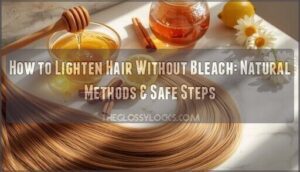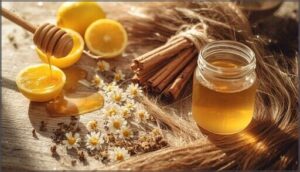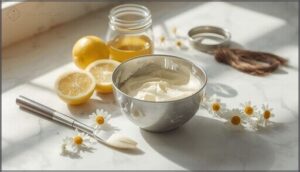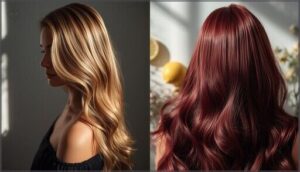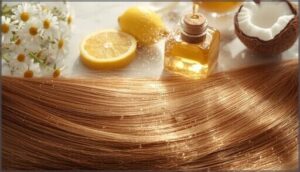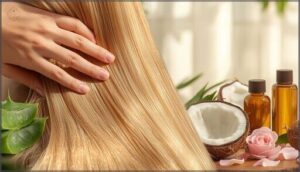This site is supported by our readers. We may earn a commission, at no cost to you, if you purchase through links.
Your natural hair color doesn’t have to be permanent, and you don’t need harsh chemicals to prove it. Salon bleach strips pigment fast, but it also strips away moisture, strength, and sometimes your confidence when damage sets in.
The truth is, ingredients sitting in your pantry right now—honey, lemon, cinnamon—trigger the same oxidation process that breaks down melanin, just at a gentler pace. These natural lighteners work with your hair’s structure instead of against it, delivering 1-3 shades of lift without the scalp burn or brittle ends.
You won’t get platinum blonde overnight, but you will get control over your color transformation while keeping your strands intact and healthy enough to style however you want.
Table Of Contents
- Key Takeaways
- Can You Lighten Hair Without Bleach?
- Best Natural Ingredients to Lighten Hair
- How to Prepare Hair for Lightening
- Step-by-Step Natural Hair Lightening Methods
- Lightening Dyed Vs. Natural Hair
- Minimizing Damage During Lightening
- Maintaining and Caring for Lightened Hair
- Frequently Asked Questions (FAQs)
- Can these natural methods lighten dark hair shades?
- Are these methods suitable for all hair types?
- How long does natural lightening take to show results?
- Can natural methods lighten black or very dark hair?
- Are natural lightening methods safe during pregnancy or breastfeeding?
- What mistakes should I avoid when lightening hair naturally?
- Conclusion
Key Takeaways
- Natural lighteners like honey, lemon juice, and cinnamon trigger oxidation that breaks down melanin just like bleach does, but they work slower and gentler—delivering 1-3 shades of lift without stripping moisture or damaging your hair structure.
- Your hair’s porosity determines how well natural methods penetrate and lift color, with fine or virgin hair responding faster than coarse or previously dyed strands that carry higher damage risk and uneven results.
- Preparation matters more than the lightener itself—clarifying buildup, deep conditioning for 1-2 weeks beforehand, and running strand tests prevent breakage and give you control over timing and color outcomes.
- Maintaining lightened hair requires switching to sulfate-free products, trimming every 6-8 weeks, and weekly deep conditioning to preserve color and prevent the brittleness that comes from opened cuticles and moisture loss.
Can You Lighten Hair Without Bleach?
Yes, you can lighten your hair without bleach, but you need to understand what you’re working with first. Natural methods won’t give you dramatic platinum results overnight, but they can lift your color a few shades lighter with patience and the right approach.
Here’s what you need to know about how these alternatives actually work, which hair types respond best, and what kind of results you can realistically expect.
How Natural Lightening Works
Natural lighteners trigger oxidation processes that break down melanin within your hair shaft. Unlike chemical bleach, natural remedies rely on gentle oxidizing agents like citric acid and enzymes to gradually fade pigment. Hair porosity determines how effectively these ingredients penetrate your cortex and disrupt melanin bonds.
Natural lighteners use gentle oxidizing agents like citric acid to gradually break down melanin, with effectiveness determined by your hair’s porosity
Here’s what happens during natural hair lightening:
- Oxidation Process dismantles conjugated bonds in eumelanin and pheomelanin
- Natural Bleaching agents generate reactive oxygen species that decolorize pigment
- Lightening Mechanisms depend on heat, sun exposure, and ingredient concentration
- Hair Porosity controls how deeply natural hair lightener penetrates your strands
- Melanin Breakdown occurs gradually through sequential oxidative reactions over multiple treatments
Suitability for Different Hair Types
Your hair texture, porosity levels, and curl patterns determine which natural hair lightening methods work best. Fine, porous strands absorb lemon juice and honey faster than coarse hair, lightening within 3-4 applications.
Virgin hair responds better to lightening dark hair naturally than color-treated strands, which carry a higher damage risk.
Tightly coiled curl patterns resist acidic lighteners, requiring extra moisture to protect natural hair care routines and maintain hair health.
Limitations and Expected Results
Even when you nail the technique, natural hair lightening methods won’t deliver salon-level transformation. Your expected outcomes hinge on hair texture, porosity effects, and starting shade—variables that create natural variations no DIY formula can override.
Here’s what to expect realistically:
- 1-3 shade lift maximum across multiple applications
- Color shift toward brassy, yellow, or orange tones requiring toning
- Uneven results from inconsistent porosity effects across your scalp
- Faster fading on porous strands versus dense, coarse hair texture
- Minimal impact on very dark hair compared to lighter brown bases
Best Natural Ingredients to Lighten Hair
You don’t need harsh chemicals to lift your hair color a few shades lighter. Your kitchen and bathroom cabinet likely hold several ingredients that work as gentle, natural lighteners when applied correctly.
Here’s what actually works and how to use each one safely on your strands.
Honey for Gentle Lightening
You’ve got a gentle bleach right in your kitchen. Raw honey produces mild hydrogen peroxide when mixed with water, making it a natural hair lightening agent.
Apply a honey-conditioner paste weekly, and you’ll see subtle Natural Tones emerge over 6–8 weeks—up to 1–2 shades lighter. This Lightening Process preserves moisture, aids Hair Restoration, and respects your strands’ integrity without harsh chemicals.
Lemon Juice and Citric Acid
Citrus is your fast-track natural bleaching agent—lemon juice benefits include releasing mild hydrogen peroxide when sunlight hits, letting you lift 1–2 levels on lighter strands. But that acidic damage risk is real: citric acid effects open your hair cuticle, strip moisture, and can fry ends if you overdo it.
Natural Hair Care Essentials:
- Pre-Condition before applying lemon juice to shield strands from brittleness
- Strand Test on hidden hair to gauge lifting power and sensitivity
- Sun Exposure activates hair lightening techniques—limit to 30–60 minutes
- Immediate Rinse with cool water to close the hair cuticle and lock moisture
- Deep Condition post-treatment to counteract dryness and restore elasticity
Cinnamon and Honey Mask
Grab your pantry’s power duo—cinnamon benefits stack with honey properties to create a gentle one-shade lift while feeding strands serious moisture.
Mix 2 tablespoons raw honey with 1 tablespoon ground cinnamon until you’ve got a smooth mask preparation, apply mid-lengths to ends, then wrap hair and let natural hair lightening methods work for 30–45 minutes before rinsing thoroughly.
Chamomile Tea Rinses
Brew a strong chamomile tea using 2 tablespoons dried flowers per cup, cool completely, then saturate hair and let sunlight activation do the heavy lifting—this gentle fading method relies on apigenin compounds working with UV rays to coax out warm-toned highlights.
Tea lightening effects deliver natural highlighting over multiple rinses, making herbal hair benefits ideal for patience-backed natural hair lightening methods.
Vitamin C Treatments
Crush 15–20 vitamin C tablets into powder, mix with clarifying shampoo to form a thick paste, then work through damp hair for 30–60 minutes—this gentle lightening method harnesses oxidation to lift 1–3 levels without harsh chemicals.
Natural hair care fans love vitamin C benefits for color correction:
- Works best on light to medium virgin hair
- Requires multiple sessions for noticeable lift
- Always deep condition afterward to restore moisture
For best results, consider using scientific study methods to evaluate hair care products.
Apple Cider Vinegar Methods
Your hair’s pH holds the key to natural fading. A vinegar rinse restores acidic balance while gently lifting pigment over time.
Mix equal parts apple cider vinegar and water, saturate clean strands, then let it work for 15–20 minutes before rinsing.
This natural hair care staple won’t dramatically lighten dark hair, but consistent use gradually brightens and boosts shine.
Saltwater and Sun Exposure
Ever notice how surfers sport lighter locks? UV radiation and saltwater create natural bleaching effects that rival lemon juice or hydrogen peroxide. Sun damage breaks down melanin while salt increases hair porosity, allowing deeper lightening—but at a cost.
Without proper hair care and UV protection, you’ll sacrifice moisture and strength. Natural remedies like these work, yet they demand vigilant conditioning to prevent brittleness.
How to Prepare Hair for Lightening
Before you start lightening your hair, you need to set the stage for success. Think of prep work as laying the foundation—it protects your strands and helps natural lighteners actually work.
Here’s how to get your hair ready for the process ahead.
Clarifying and Removing Buildup
Before you begin hair lightening, you need to strip away product residue and mineral buildup that block color penetration.
Use a clarifying shampoo with chelating agents like EDTA once every 1-4 weeks to remove calcium deposits from hard water. For stubborn buildup, mix baking soda with your regular shampoo—this deep-cleans your strands without compromising scalp care or hair health.
Moisturizing Before Treatment
After clearing buildup, you’re ready to flood your strands with hydration—your hair’s armor against lightening stress. Pre Treatment Care demands deep conditioning 1–2 weeks before you start. Choose a hair mask rich in humectants to boost moisture balance and strengthen the cuticle. This deep conditioning protocol cuts breakage by half and sets you up for smoother, healthier results.
Why Hair Hydration matters before lightening:
- Cuticle Repair locks in elasticity and prevents your strands from snapping mid-process
- Leave-in conditioners hold moisture for 24 hours, giving your hair a fighting chance
- Argan or coconut oil seals porosity, so you don’t lose hydration when you lift color
- Consistent moisture routines improve manageability and make lightening more predictable
- Hydrated hair bounces back faster, keeping your hair health and maintenance on track
Performing a Strand Test
Once your hair is primed, pick a hidden strand at your nape—your first checkpoint against disaster. Clip a thin section, apply your natural hair bleaching mix, then watch the clock.
Check every 10 minutes for color monitoring and damage assessment. Snap photos for result documentation—this strand test data drives your entire hair lightening strategy and locks in hair damage prevention before you commit.
Step-by-Step Natural Hair Lightening Methods
Now that your hair is prepped and ready, it’s time to apply your chosen natural lightening treatment. The key to getting results without frying your strands is mixing ingredients correctly, timing your process, and caring for your hair afterward.
Here’s how to lighten your hair step-by-step using natural methods that won’t wreck your texture.
Mixing and Applying DIY Lighteners
Precision is everything when you’re mixing DIY lighteners. Grab a non-metal bowl and blend your ingredients into a smooth paste or solution.
Always conduct a strand test on dry, sectioned hair before going all-in, and use a brush for even distribution.
Document your mixing ratios and keep acidic formulas like lemon juice or hydrogen peroxide away from your scalp.
Timing and Processing Tips
Generally, natural hair lightening methods require 15 to 45 minutes depending on the formula—lemon juice and hydrogen peroxide work faster, while honey-based mixes need longer processing intervals. Check your strands every 5 to 10 minutes to prevent damage.
Keep heat control in mind: sun exposure accelerates lightening but raises UV damage risk. Environmental factors like humidity affect timing strategies, so adjust accordingly.
Rinsing and Post-Treatment Care
Thorough rinse techniques matter most after hair lightening—use cool to lukewarm water to seal cuticles and lock in moisture. Gentle rinsing preserves color and prevents residue buildup.
Follow with a sulfate-free shampoo and lightweight conditioner on mid-lengths and ends.
Within 10 minutes of post-treatment, apply a leave-in conditioner or light serum to support hair health and wellness while protecting your natural remedies results.
Lightening Dyed Vs. Natural Hair
Natural lightening methods work differently on dyed hair versus virgin strands, and knowing the difference can save you from disappointment or damage.
Artificial color requires a different approach than your natural pigment, with its own timeline and risks. Here’s what you need to understand before you start lightening either type.
Fading Artificial Color Safely
Stripping color without wrecking your strands takes strategy. Gentle washing with sulfate-free clarifying shampoo speeds up color fade rates without destroying moisture, while UV protection products guard against sun-triggered pigment breakdown. Hair porosity determines how fast dye escapes—higher porosity fades faster. Always strand-test your dye removal method before going all-in.
| Hair Dye Removal Methods | Fade Timeline |
|---|---|
| Clarifying shampoo cycles | 2–6 weeks |
| UV exposure (unprotected) | Accelerated breakdown |
| Bond-building treatments | Maintains integrity during fade |
| Color-safe glosses | Evens tone without stripping |
| Cooling water rinses | Preserves remaining pigment |
Lightening treatments and hair color correction work best when you prioritize hydration—deep condition between sessions to prevent breakage.
Effectiveness on Virgin Hair
Virgin hair responds slower to natural lightening than color-treated strands—you’re working against intact melanin. Lemon juice lifts 1-2 shades with sun exposure, honey gives about 1 shade, and chamomile offers 0.5-1 shade on lighter bases. Hair porosity and undertone dictate your color lift ceiling. Natural hair bleaching won’t deliver platinum, but gentle bleaching alternatives prevent damage during lightening dark hair.
| Natural Lightening Method | Expected Lift on Virgin Hair |
|---|---|
| Lemon juice + sun | 1–2 shades |
| Honey treatments | ~1 shade |
| Chamomile rinses | 0.5–1 shade |
| Vitamin C powder | 0.5–1.5 shades |
| Apple cider vinegar | Minimal lift, cuticle clarifying |
Risks for Previously Colored Hair
Previously colored hair doubles your hair damage risk—residual pigments create chemical interactions with any lightener. You’re facing porosity issues that cause patchy lift, color shift toward brass or green, and compromised bonds that snap under stress.
Breakage prevention starts with understanding your base: compromised cuticles absorb unevenly, and natural hair bleaching on dyed strands amplifies protein loss.
| Risk Factor | Impact on Previously Colored Hair |
|---|---|
| Porosity issues | Uneven absorption, overprocessing in sections |
| Chemical interactions | Unwanted yellowing, greenish tones from copper dyes |
| Bond damage | Increased breakage, snap from weakened structure |
Minimizing Damage During Lightening
Lightening your hair doesn’t have to mean destroying it in the process. You’re in control here, and with the right protective steps, you can safely lift your color while keeping your strands healthy and strong.
Let’s break down the essential damage-control strategies you need to master before, during, and after any lightening treatment.
Hydration and Deep Conditioning
Your hair’s moisture balance is your first line of defense against lightening damage. Deep conditioning restores hair porosity and repairs the cuticle after natural treatments strip away protection. Use these hydration techniques to bulletproof your strands:
- Apply a coconut oil hair mask 24–72 hours before lightening to maximize moisture content
- Follow with protein-rich hair treatments 2–3 times weekly during recovery
- Seal cuticles with cold-water rinses to lock in hydration and maintain hair health
Choosing Gentle Application Techniques
Once you’ve loaded your hair with moisture, smart application makes all the difference. Sectioning hair into four quadrants guarantees uniform coverage and prevents the dreaded splotchy finish. Always perform strand testing on a hidden section for 20–30 minutes—this simple step reveals exactly how your unique hair reacts to lemon juice or any natural hair bleaching mix before you commit.
Gentle Application Essentials
| Technique | Purpose | Damage Minimization Benefit |
|---|---|---|
| Wide-tooth comb distribution | Even product spread | Reduces breakage during application |
| Barrier cream at hairline | Scalp protection | Prevents skin irritation from citrus acids |
| Diluted mixtures | Controlled lightening | Slows processing, limits cuticle stress |
| Cool-water rinse | Cuticle sealing | Locks moisture, reduces frizz post-treatment |
Apply your hydrogen peroxide alternative or natural lightener to damp, towel-dried hair—this controls processing time and minimizes scalp irritation. Keep a timer visible and rinse immediately if you feel any burning sensation.
Protective Styling After Lightening
After gentle application, lock in your gains with protective styling. Braids, twists, or low buns tuck ends away, shield strands from friction, and boost moisture retention—critical for Scalp Care and hair damage repair.
Wear styles for 1–2 weeks, use satin bonnets to prevent loss overnight, and when you’re ready to switch, start gentle detangling at the tips to preserve your hard-won lightening results.
Maintaining and Caring for Lightened Hair
Once you’ve lightened your hair, the real work begins—keeping it healthy, vibrant, and damage-free. Lightened strands need extra care to prevent dryness, breakage, and fading.
Here’s how to protect your new color and maintain strong, beautiful hair for the long haul.
Using Moisturizing Shampoos and Conditioners
Your strands need serious backup after any hair lightening adventure. Switch to sulfate-free formulas that protect hair elasticity and deliver gentle cleansing without stripping natural oils. Lock in moisture balance with these essentials:
- Use hydrating masks weekly to rebuild strength
- Apply leave-in conditioners for ongoing protection
- Choose pH-balanced products that seal cuticles
- Rotate moisturizing shampoos to prevent buildup
This organic hair care products routine safeguards your natural remedies results and maintains long-term hair health and maintenance.
Regular Trims and Split End Prevention
Keeping your lightened strands in fighting shape means cutting off trouble before it spreads. Schedule hair trimming every 6–8 weeks—just 1/4 inch removes damaged ends and boosts breakage prevention by 60 percent. Sharp scissors matter for split end repair and frizz reduction.
Pair cuts with leave-in conditioner for hair strengthening, gentle detangling for hair damage repair, and protective styles that support ongoing hair growth.
Long-Term Hair Health and Color Retention
Consistency builds hair strength and color preservation that lasts. Deep condition weekly to lock in moisture balance and boost tensile integrity by 40 percent over four weeks.
Use sulfate-free products for damage control—they slash pigment loss by half. Heat protectants preserve your natural remedies, while organic hair care products maintain color retention between treatments.
Frequently Asked Questions (FAQs)
Can these natural methods lighten dark hair shades?
Yes, but don’t expect miracles. Natural lightening methods can shift dark brown hair by one to three shades under ideal conditions, though black hair resists lift markedly and results remain unpredictable across different hair porosity levels.
Are these methods suitable for all hair types?
Natural hair bleaching works differently across hair texture and porosity factors. Ethnic hair and damaged strands face higher damage risks due to natural limits in chemical free hair lightening methods.
How long does natural lightening take to show results?
Your hair’s porosity and melanin determine how fast you’ll see color shift. Natural lightening speed varies—most notice visible results after 2-4 weeks of consistent lemon juice or hydrogen peroxide applications.
Can natural methods lighten black or very dark hair?
Lightening dark hair naturally delivers subtle results at best—think minor tonal shifts, not dramatic change.
Melanin reduction requires oxidation that hydrogen peroxide and lemon juice provide weakly, making gentle bleaching effects inconsistent on black strands.
Are natural lightening methods safe during pregnancy or breastfeeding?
Before trying any natural hair bleaching or chemical-free beauty approach, talk to your doctor—pregnancy safety data remain limited, topical irritation risks increase, and breastfeeding risks aren’t well-studied for organic hair care agents.
What mistakes should I avoid when lightening hair naturally?
Skip overstressing strands with excessive heat and acidic mixtures, neglecting patch tests, or expecting dramatic shifts.
Gentle methods require realistic expectations, proper timing, and consistent hydration to minimize hair damage during DIY hair treatments.
Conclusion
The best lightening happens when you refuse to rush it. Natural methods to lighten hair without bleach give you exactly what chemical processes can’t: results you can control, reverse, and repeat without destroying your hair’s foundation.
Your strands get lighter while staying strong enough to handle heat, moisture, and whatever style you choose next. That’s not compromise—it’s strategy. You’re not settling for less color; you’re building more options.

